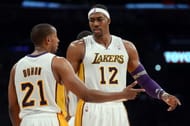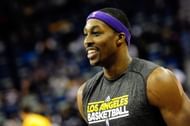NEW YORK, NY – DECEMBER 13: Dwight Howard #12 of the Los Angeles Lakers walks the court during the shoot around prior to the game against the New York Knicks at Madison Square Garden on December 13, 2012 in New York City. NOTE TO USER: User expressly acknowledges and agrees that, by downloading and/or using this photograph, user is consenting to the terms and conditions of the Getty Images License Agreement. The Knicks defeated the Lakers 116-107.
For a very long time, the answer to “Who is the best defensive player in the NBA?” was a no-brainer. For the last four years, the answer has unequivocally been Dwight Howard. He is a three-time Defensive Player of the Year from 2009-11 and missed out narrowly (and some would say unfairly) on a fourth consecutive award last season.
He has four consecutive All-Defensive First team selections. A freak of an athlete in a seemingly indestructible physical frame, a shot-blocker unrivalled in the 21st century. For the past four seasons, Dwight Howard has posted Defensive Ratings (points conceded per 100 defensive possessions – considered the most accurate comprehensive measure of defensive impact) of 96, 94, 95, 95 (the NBA average is typically a few points above 100) which is eye-popping, to say the least. He single-handedly anchored a Magic defense and led it to the NBA Finals (with minus-defenders like Hedo Turkoglu, Rashard Lewis, Courtney Lee playing heavy minutes for the team). While this may appear as commonsense knowledge for the average NBA fan, it’s important to recall because of the trends in this NBA season, when the LA Lakers are two game below .500.
Because today, 26 games into the season, Dwight Howard is a negligible defensive force on an old and creaky Lakers team. Or to phrase it differently, Dwight Howard’s impact on the Lakers defense has been only a slight positive, which is a steep drop-off from being the defense uberman of previous years.
Explore the NBA Draft 2024 with our free NBA Mock Draft Simulator & be the GM of your favorite NBA team.
The Lakers have the NBA’s 14th best defense, by defensive efficiency – points allowed per 100 possessions – and are tied with the Wizards at 102.4. Their defensive shortcomings have been varied and consistent; they’re old, they turn the ball over too much and then fail to defend in transition, they don’t rotate to open shooters fast enough, they struggle to chase players around screens…basically 90% of defense. When you’ve got point guards like Steve Blake and Chris Duhon and a sometimes-effective Kobe on defense, dribble penetration is another problem. Here’s where Howard should – per his skill-set – come into play. Only, it appears that he doesn’t.

LOS ANGELES, CA – DECEMBER 02: Dwight Howard #12 and Chris Duhon #21 of the Los Angeles Lakers talk during a 113-103 Magic win at Staples Center on December 2, 2012 in Los Angeles, California.
While his overall stats suggest no drop-off (he’s averaging 2.6 blocks and 1 steal per game, great numbers for even an elite NBA player), advanced stats suggest otherwise. When Howard’s on-court the Lakers outscore their opponents by 1.7 point per game, which though short of his normal impact, is still fine. When Howard leaves the game, the Lakers outscore their opponents by 9.3 points a game – a whole 7.6 point swing in the negative. This, of course, is surprising considering that -with Nash and Gasol out to injury- the Lakers have few quality options and a wafer-thin bench.
Howard is not a great offensive player, and is averaging only a little over 11 FG attempts per game which is understandable given the Kobe-centric offense. In addition, he misses free throws (49% for the season) – especially in the clutch – which leads to teams fouling him often and this brings the offense to a grinding halt. So it’s perfectly understandable that the Lakers should have a better offense when he’s off-court (115.4 points per 48) than when he’s on-court (108 per 48). What’s surprising is that the Lakers defense doesn’t improve significantly with him on the court and he’s also posting his worst Defensive Rating in 7 seven years (101). Simply put, when he’s off-court, the Lakers offense understandably improves, but they shouldn’t be outscoring their opponents by such a huge margin, especially given their poor bench production!
In comparison, the on-court off-court swing for Kobe is an amazing 21.5 points. Basically, when the Lakers sit Kobe, they get outscored by 13.1 points, and when he’s on the floor, they outscore their opponents by 8.5 points. +/- numbers rarely lie, and even though the sample size is small, the numbers indicate that Howard’s impact on the Lakers has been negligible. In fact, the starting lineup that has logged most minutes with Howard has been Darius Morris-Kobe-Metta-Gasol-Howard, and this lineup has a total +/- of -14 and an (unadjusted) Defensive Rating of 105. In individual terms, this should be the Lakers’ best defensive lineup (Howard and Metta are the best LA defenders, and Morris is the best of the point guards defensively) but they’ve struggled against opposing starting lineups. Dwight Howard’s numbers indicate his inability to shore up the team’s defense overall, and the Lakers – given their age and defensive ability – count on him heavily to bail them out in the paint.

NEW ORLEANS, LA – DECEMBER 05: Dwight Howard #12 of the Los Angeles Lakers warms up prior to a game against the New Orleans Hornets at New Orleans Arena on December 5, 2012 in New Orleans, Louisiana.
So why has Dwight’s defense fallen off a cliff? TrueHoop’s Henry Abbott provides some answers:
“Often, he was the last player down the floor. Howard told reporters in training camp that conditioning was his main focus. Lo and behold, he looked out of shape, which seems a silly thing to say about one of the most in-shape-looking humans on the planet.”
Dwight Howard’s rehabilitation from injury has considerably diminished his speed, quickness and leaping ability. Video of the Lakers’ performances show a shockingly slow Howard, always just a little late to his man or on the help. His transition defense is beyond shocking. It is actually painful to see him shuffle up the court without urgency when the Lakers blow a lead to an overachieving Magic team short on talent. In this game against Orlando, his former team, Howard is always the last guy back on defense (and this is in clutch time) and more often than not, his team gives up uncontested shots. By his own admission, Howard is still not at 100% physically, which should be what Lakers fans take solace from. More than Gasol and Nash, the Lakers need Howard to be the defensive force he was with the Magic, if they’re to have any chance of slugging it out with the likes of Oklahoma City and San Antonio.
Los Angeles Lakers Fan? Check out the latest Lakers depth chart, schedule, and roster updates all in one place.